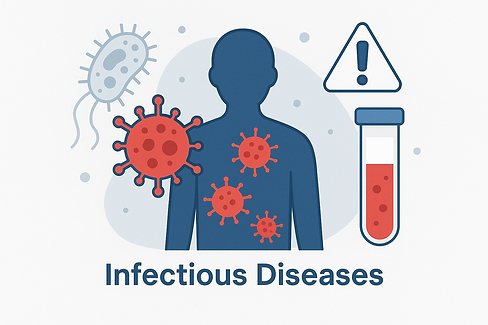


CURRENT RESEARCH AREAS
This page presents the current research areas of our lab, highlighting key topics like antimicrobial resistance, neurodegeneration, and infectious diseases. It showcases the focus of our ongoing projects and the efforts of our team to advance knowledge and develop new solutions in these important fields.

Antimicrobial Resistance
Antimicrobial resistance (AMR) is a major global health challenge that occurs when microorganisms such as bacteria, viruses, fungi, and parasites evolve to withstand the effects of antimicrobial drugs designed to kill them or stop their growth. This resistance reduces the effectiveness of standard treatments, leading to persistent infections, increased transmission, and higher mortality rates. AMR arises primarily due to the overuse and misuse of antibiotics and other antimicrobials in humans, animals, and agriculture, as well as poor infection control practices. The growing prevalence of resistant strains threatens to undermine decades of progress in modern medicine, making common infections harder to treat and increasing the risk of complications from routine medical procedures. Research in this area focuses on understanding the molecular mechanisms behind resistance, tracking the spread of resistant pathogens, and developing novel therapeutic approaches such as new antibiotics, alternative therapies, and improved diagnostic tools. Addressing antimicrobial resistance requires a multidisciplinary approach involving surveillance, stewardship, innovation, and global cooperation to preserve the effectiveness of existing treatments and protect public health. Read More
Neurodegenerative Diseases
Neurodegeneration refers to the progressive loss of structure, function, and ultimately the death of neurons in the nervous system. This process underlies a range of debilitating neurological disorders, including Alzheimer’s disease, Parkinson’s disease, Huntington’s disease, and amyotrophic lateral sclerosis (ALS). Neurodegenerative diseases are characterized by gradual cognitive decline, motor dysfunction, and other neurological impairments that severely impact quality of life. The exact causes of neurodegeneration are complex and multifactorial, involving genetic, environmental, and cellular factors such as protein misfolding, mitochondrial dysfunction, oxidative stress, and inflammation. Research in this field aims to unravel the molecular and cellular mechanisms that drive neuronal loss, identify early biomarkers for diagnosis, and develop effective therapies to slow or halt disease progression. Understanding neurodegeneration is crucial for addressing the growing burden of neurological disorders in aging populations worldwide. Read More


Infectious Diseases
Infectious diseases are disorders caused by pathogenic microorganisms such as bacteria, viruses, fungi, or parasites that invade the body and multiply, leading to illness. These diseases can spread directly from person to person, through contaminated food or water, via vectors like mosquitoes, or from animals to humans. Infectious diseases range from common illnesses like the flu and tuberculosis to more severe outbreaks such as Ebola or COVID-19. They remain a significant cause of morbidity and mortality worldwide, particularly in low-resource settings. Research in infectious diseases focuses on understanding how pathogens infect and interact with the host, the immune responses they trigger, and the factors influencing disease transmission. This knowledge is critical for developing effective prevention strategies, vaccines, diagnostics, and treatments to control and eliminate infections and protect public health globally. Read More